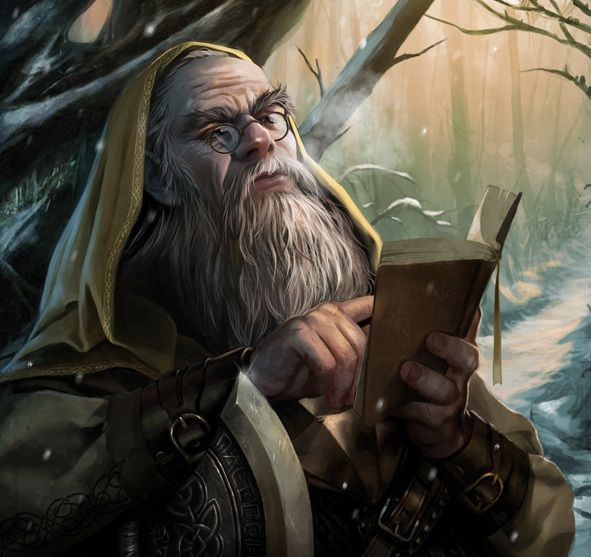Sage Ability
Sage Abilities describe a wide number of skills and training that blocks out the game character's knowledge points and skilled capabilities. Sage abilities are organized into sage "studies" — subject matter headings — which are, in turn, subordinate to larger branches of scholarship called sage "fields". Intentionally, all character knowledge and mundane abilities are contained in the heading of "sage abilities," including a great many others that directly affect game elements such as magical research, combat, the game's setting and even religious communication with the gods.
Most sage abilities are a mixture of crafts, detailed knowledge about the world, adjustments to physical fitness, mental endowments and practices surrounding magic of a non-spellcasting nature. There are literally more than a thousand sage abilities, most of which are little more than an idea proposed by this wiki. As time goes on, more and more identified sage abilities will be described and "fleshed out," while more are bound to be proposed in the future. There are so many that most abilities may never be directly possessed by the player characters; but as the occupation and knowledge of every worldly character, player and non-player alike, is described through their sage ability, someone, somewhere in the world, will be an expert in that particular bit of knowledge.
Contents
Acquiring Abilities
Once the character's ability stats have been generated and the character's class is chosen, the player chooses one of their available sage fields. Most classes have four fields. The druid has three and the bard — a very odd class — has sixteen. Once a field is chosen, the studies and sage abilities within that field are described, for the character, as "in field." All other studies and abilities available to the class are "out of field."
Next, the player chooses a study in that field; there are usually four studies available, but some variance occurs. Each study includes a set of sage abilities, some of which become part of the character's repertoire. There is no "point buy" involved, but advanced sage abilities require the character to obtain a higher level; this is described below.
"Abilities" are things the character is able to DO. For example, a druid that possesses the study of oceanography is automatically able to swim well. No die roll is necessary. The same character would also have full knowledge of the tides, where the water is safe, what are the best places to fish and how to sail. None of these things are in question. Knowing these things, and the abilities they provide, rounds out the character's relationship with the game setting, defining what they know and what capabilities they have. Likewise, it defines what the character doesn't know, and what the character can't do. If a character does not possess sailing ability, the character can't function as a sailor — although they could follow directions and acquire the ability over time. This is done through instruction.
Ability Ranking
Starting with childhood, characters have no knowledge at all; being levelled, they begin their schooling at ten, progressing into higher learning for their character class by the age of 13 to 15. Prior to entering the campaign, the character accumulates 10 knowledge points, enough to rate as an "amateur" in their chosen study, whereupon the character will have two or more sage abilities. Thereafter, as the character progresses in experience levels, they gain additional knowledge points; these are scattered across multiple studies, both in and out of their fields. As these points accumulate, the character becomes an amateur in other studies, acquiring additional sage abilities.
With time, the character reaches 30 points in a particular sage study, becoming an "authority" and unlocking additional sage studies representing a furthering of the character's knowledge. With even more points, the character can become an authority in still other studies, each of which brings more abilities. This progresses further when the character becomes an "expert" (60 knowledge points) and eventually a "sage" (100 points). Progressively, the character develops from knowing a few things to becoming a rounded expert on most abilities associated with the character class's whole range of abilities, which could number as many as sixty or seventy.
So long as the character continues to level, this progress inevitably occurs. The order in which sage abilities are gained, and the extent to the status-ranking each study can reach, depends on early choices the player makes about the character's interests.
_____ EDIT LINE _____
Non-Player Characters
Levelled non-player characters gain abilities just as player characters do, though most likely there will be little need to pre-determine the extent of an NPC's knowledge, except with characters who are of great importance in a campaign.
Non-levelled non-player characters will possess only one or two sage abilities, without further knowledge surrounding a sage study and with very little capacity to improve their knowledge points. For example, cooking is a sage ability; an ordinary cook will possess that ability, but would be unlikely to expand it. That is because non-levelled persons obtain knowledge in a particular ability through previous one-time training they've obtained, and not through investigation.
Gaining Additional Abilities
All persons, regardless of their class or levelled-status, can be trained in any amateur sage ability through instruction. For example, an individual without any previous knowledge, and without the need to accumulate experience points, can be taught how to swim or cook, as these are both amateur-status abilities. A person cannot be learn to be an authority or higher status without first being trained to become a levelled character (which is also possible through instruction).
